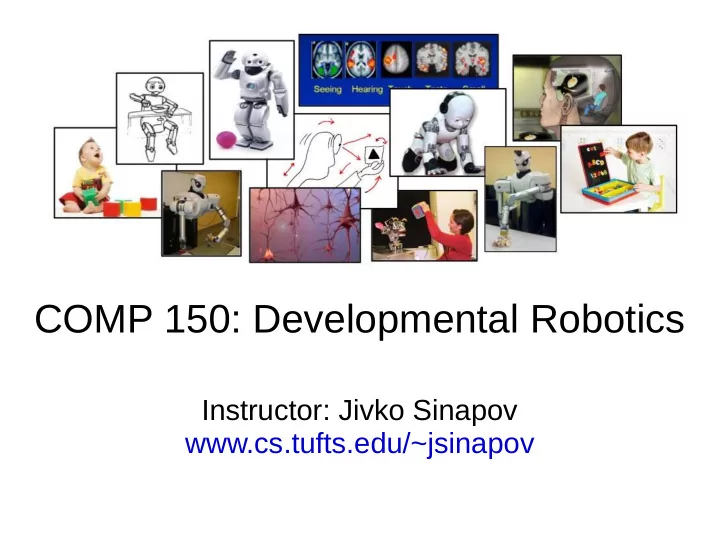

COMP 150: Developmental Robotics Instructor: Jivko Sinapov www.cs.tufts.edu/~jsinapov
Introduction ● Welcome! ● Who am I? ● Who are you? ● What to expect
My robot friends...
Stand or Sit
What is a robot? (class discussion)
Robots in Industry
Mobile Robots
“Service” Robots
Planetary Exploration Robots
Driverless Cars
Entertainment Robots
Robots in Science Fiction
Toyota's Attempt 20 years later...
Toyota's Attempt 20 years later...
Why are we not there yet? What are the greatest difficulties towards getting robots to be autonomous and intelligent?
Developmental Robotics “Truly intelligent robot behavior cannot be achieved in the absence of a prolonged interaction with a physical or social environment. In other words robots must undergo a developmental period similar to those of humans and animals.” - Alexander Stoytchev
Developmental Robotics ● Relatively small sub-field...but with great potential ● Started early 2000s – many ideas have now filtered out and become mainstream ● Relatively unexplored
Repeating Themes ● Pre-programming is not enough! ● Interaction ● Embodiment ● Self-organization ● Grounding ● Verification and correction of internal representations ● Stages of development...
Topics ● Overview of robotics – Robot architectures, mobile robots and robot manipulators, learning methods for robots ● What is intelligence? ● Theories of Development – Nature vs Nurture? Or something else? ● Embodiment and the Sense of Self – Body scheme, self-recognition
Topics (2) ● Learning about objects and their affordances ● Tool use in humans, animals, and robots ● Multi-modal sensing and self-organization ● Theories of vision in humans and robots ● Social learning – Language, scaffolding, socially-guided learning ● ...
Robot Simulators
What is Intelligence?
Embodiment
The Sense of Self
Body Schema
Extensible Body Schema
Self-Recognition
Self-Recognition in Robots
Theories of Development
Theories of Development
Affordances
Example: Doors
Learning Affordances
Tool Use
Tool Use by Robots
Sensory Substitution
Image-to-Sound Mapping
Sensory Substitution
Theories of Vision
Language Acquisition
Language Acquisition
...and much more!
Reading Assignment 1 ● Posted on course website
Homework 0 ● Read the syllabus and the course web page and think of a question you have that is not answered – email it to me (subject: [comp150])! ● Course web-page: http://www.cs.tufts.edu/comp/150DR/
Questions / Comments?
Recommend
More recommend